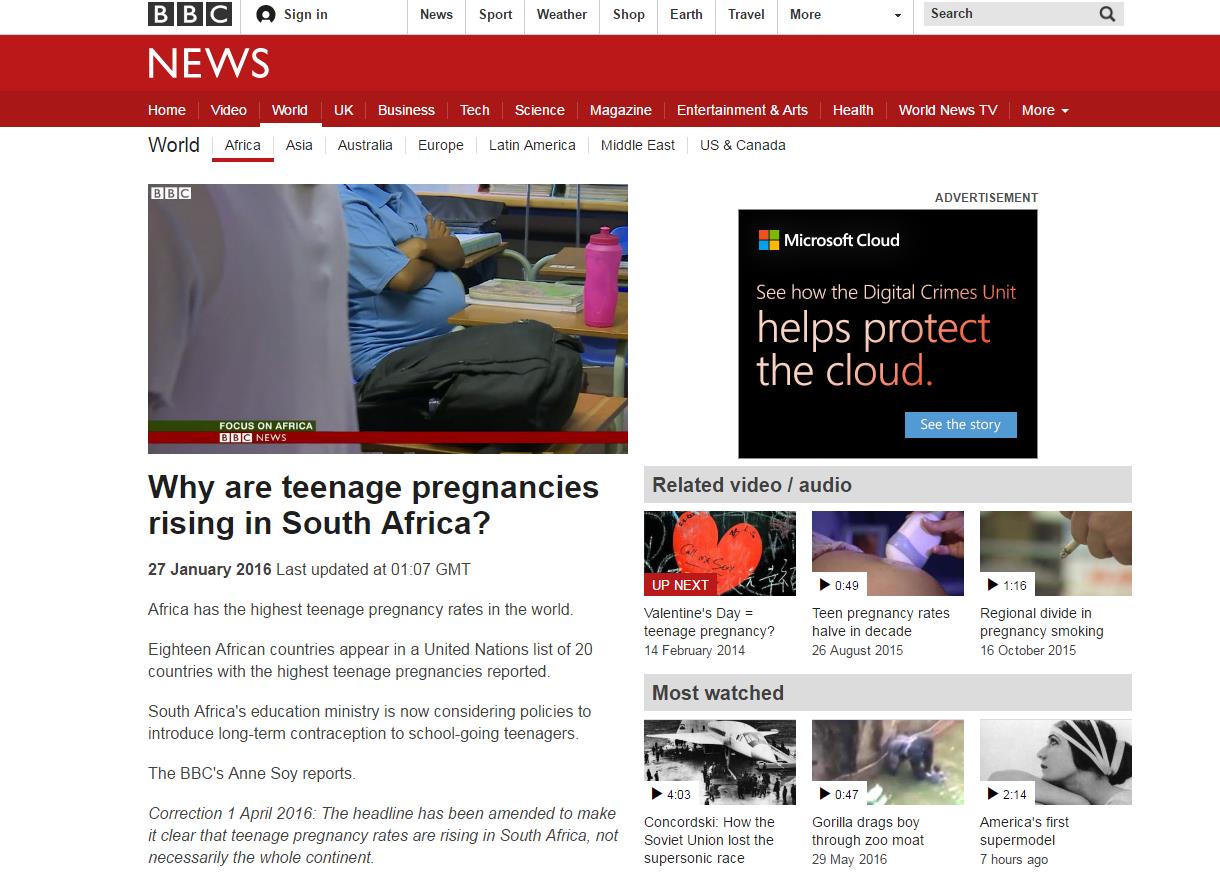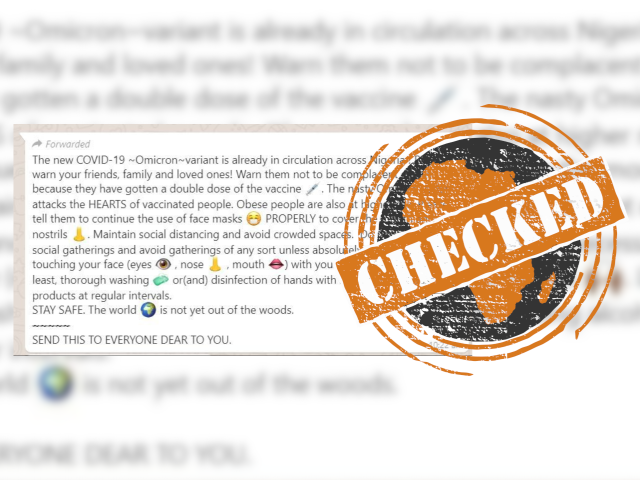This article is more than 7 years old
There is no evidence that teenage pregnancies in Africa are rising. Is the situation in South Africa any different?
After Africa Check fact-checked a BBC.com headline earlier this year - which read “Why are teenage pregnancy rising in Africa?” - the British news organisation changed it to “Why are teenage pregnancies rising in South Africa?”
We set out to determine if the new headline passed muster.
Statistics South Africa’s latest data on teenage pregnancies, shows a “fairly stable” trend, according to Dr Isabelle Schmidt, the agency’s chief director of social statistics.
The agency asks: “Has any female household member been pregnant during the past 12 months?” in its annual general household survey. The percentages indicate the proportion of 15-19-year-olds who had been pregnant in the preceding year:
Said Schmidt: “When I look at the long-term trends between 2009 and 2014, I would say that overall it has remained fairly stable albeit with some fluctuations from year to year. However, there was a slight decline between 2013 and 2014.”
There is a chance that the data is an underestimate, though. Senior researcher at the Southern Africa Labour and Development Research Unit (Saldru), Dr Nicola Branson, told Africa Check that “pregnancies that do not end in live births are underreported in national household surveys where this is not the focus.”
 A 2013 review of teenage pregnancy in South Africa, authored by Samantha Willan, notes a “slow decline in teenage pregnancy since the 1980s”. This is based on data from South Africa’s Demographic and Health Surveys (DHS), which are nationally representative household surveys.
A 2013 review of teenage pregnancy in South Africa, authored by Samantha Willan, notes a “slow decline in teenage pregnancy since the 1980s”. This is based on data from South Africa’s Demographic and Health Surveys (DHS), which are nationally representative household surveys.
The proportion of women aged 19 who had ever been pregnant dropped from 35.1% to 27.1% between the two latest South African DHSes (1998 and 2003).
Professor Rachel Jewkes, co-author of the 2009 paper cited in Willan’s review as the source of the claim about the decline in the teen pregnancy rate since the 1980s, told Africa Check new national demographic data with age at first pregnancy and birth had not been collected since 2003 and therefore there is “no evidence of an increase” since then.
Willan, capacity development manager of the What Works To Prevent Violence Against Women and Girls programme, attributes the “slight decline” to a strong women’s rights sector. She told Africa Check: "There has been a lot more conversation and openness around reproductive health and sexuality.”
Why hasn’t there been a bigger decrease? Willan said South Africa is not yet dealing with “the fundamental stuff”: inequality, poverty and gender-based violence, which remains the context within which policies and interventions are being implemented.
By changing their headline to imply that teen pregnancies are rising in South Africa the BBC once again got it wrong.
The proportion of 15-19-year-olds who had been pregnant in the year preceding a number of household surveys in South Africa (2009 to 2014) has been “fairly stable”, Statistics South Africa said.
Data from South Africa’s Demographic and Health Surveys (DHS) shows that teenage pregnancy has been on the decline from the 1980s to 2003. As a new survey has not been conducted since 2003, “there is no evidence of an increase” in teenage pregnancy after 2003, an expert told Africa Check.
The BBC.com headline therefore needs to be corrected once again.
Additional reading
No evidence that teen pregnancies in Africa are rising as BBC headline said
Do a third of SA women have a baby by 19?
South Africa: The myth of teenage pregnancy and child support grants
After Africa Check fact-checked a BBC.com headline earlier this year - which read “Why are teenage pregnancy rising in Africa?” - the British news organisation changed it to “Why are teenage pregnancies rising in South Africa?”
We set out to determine if the new headline passed muster.
Proportion of pregnant teens stable
Statistics South Africa’s latest data on teenage pregnancies, shows a “fairly stable” trend, according to Dr Isabelle Schmidt, the agency’s chief director of social statistics.
The agency asks: “Has any female household member been pregnant during the past 12 months?” in its annual general household survey. The percentages indicate the proportion of 15-19-year-olds who had been pregnant in the preceding year:
Said Schmidt: “When I look at the long-term trends between 2009 and 2014, I would say that overall it has remained fairly stable albeit with some fluctuations from year to year. However, there was a slight decline between 2013 and 2014.”
There is a chance that the data is an underestimate, though. Senior researcher at the Southern Africa Labour and Development Research Unit (Saldru), Dr Nicola Branson, told Africa Check that “pregnancies that do not end in live births are underreported in national household surveys where this is not the focus.”
‘No evidence of an increase’
 A 2013 review of teenage pregnancy in South Africa, authored by Samantha Willan, notes a “slow decline in teenage pregnancy since the 1980s”. This is based on data from South Africa’s Demographic and Health Surveys (DHS), which are nationally representative household surveys.
A 2013 review of teenage pregnancy in South Africa, authored by Samantha Willan, notes a “slow decline in teenage pregnancy since the 1980s”. This is based on data from South Africa’s Demographic and Health Surveys (DHS), which are nationally representative household surveys.The proportion of women aged 19 who had ever been pregnant dropped from 35.1% to 27.1% between the two latest South African DHSes (1998 and 2003).
Professor Rachel Jewkes, co-author of the 2009 paper cited in Willan’s review as the source of the claim about the decline in the teen pregnancy rate since the 1980s, told Africa Check new national demographic data with age at first pregnancy and birth had not been collected since 2003 and therefore there is “no evidence of an increase” since then.
Willan, capacity development manager of the What Works To Prevent Violence Against Women and Girls programme, attributes the “slight decline” to a strong women’s rights sector. She told Africa Check: "There has been a lot more conversation and openness around reproductive health and sexuality.”
Why hasn’t there been a bigger decrease? Willan said South Africa is not yet dealing with “the fundamental stuff”: inequality, poverty and gender-based violence, which remains the context within which policies and interventions are being implemented.
Conclusion: Claimed increase in teen pregnancy in SA incorrect
By changing their headline to imply that teen pregnancies are rising in South Africa the BBC once again got it wrong.
The proportion of 15-19-year-olds who had been pregnant in the year preceding a number of household surveys in South Africa (2009 to 2014) has been “fairly stable”, Statistics South Africa said.
Data from South Africa’s Demographic and Health Surveys (DHS) shows that teenage pregnancy has been on the decline from the 1980s to 2003. As a new survey has not been conducted since 2003, “there is no evidence of an increase” in teenage pregnancy after 2003, an expert told Africa Check.
The BBC.com headline therefore needs to be corrected once again.
Additional reading
No evidence that teen pregnancies in Africa are rising as BBC headline said
Do a third of SA women have a baby by 19?
South Africa: The myth of teenage pregnancy and child support grants
Births to teenage mothers in South AfricaBirth data and pregnancy data are not one and the same: stillbirths, miscarriages and abortions are counted as pregnancies, but not as live births. In South Africa, the birth rate for teenagers (live births per 1,000 women aged 15 to 19 years) has been on the decline over the past two decades, according to the United Nations economic and social affairs department’s World Fertility Patterns 2015. It dropped from 91 per 1,000 between 1990 and 1995 to 51 in 2010 to 2015. These rates are based on census data, the 2007 Community Survey, fertility estimates from Stats SA (2010) as well as the country’s Demographic and Health Surveys of 1998 and 2003. ‘A very flat trend’The Southern Africa Labour and Development Research Unit (Saldru), based at the University of Cape Town, compared the proportion of women who gave birth by age 20 between 1984 and 2008. Their research was based on five household surveys between 1994 and 2002 and their National Income Dynamics Study of 2008. It found a decrease in the proportion of women who give birth by age 20: from 30% to 23%. However, Dr Nicola Branson, a senior researcher at Saldru, told Africa Check that the sample used to calculate the 2008 estimate was less than 300. “[A]lthough the point estimate is lower, it is not statistically significantly lower. Therefore to be completely accurate we should say that there is no evidence that the percentage of 20-year-olds who gave birth before age 20 had increased in 2008. In fact, updated estimates from the Census 2011, show a very flat trend.” Delivery data downAnother available measure in South Africa is what proportion deliveries to mothers under 18 years make up of all deliveries in health facilities. (Note: These figures are influenced by both the number of deliveries to women under 18 years and the number of deliveries to older women.) The data for under-18s, supplied by the Health Systems Trust, a non-profit organisation, shows a downward trend: Senior researcher Dr Nienke van Schaik told Africa Check this data is largely from public health facilities, where the majority of deliveries happen. “The private sector data (is) not complete or comprehensive.” The figures also exclude deliveries taking place before arrival at the facility, home deliveries, miscarriages and abortions. Limitations of the data include that it is “very dependent on how accurately data is captured by nursing staff into the delivery register at the facilities and how well the data management system functions”. The age of the mother on the day of delivery may also be captured incorrectly, said Van Schaik. |





Add new comment